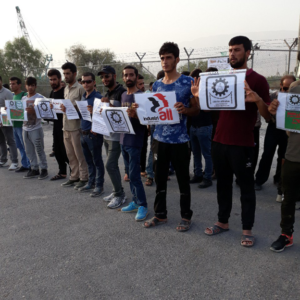30 September, 2021Over the past three years, contract workers on Iranian oil projects have improved their conditions through a series of wildcat strikes. Now an activist from IndustriALL’s Iranian affiliate UMMI has been formally mandated to represent the workers in negotiations with the oil companies, the National Iranian Oil Company (NIOC) and the government.
Iranian contract oil workers started a wave of wildcat strike action across the sector on 19 June this year. The tactic emerged after workers took action in the city of Assaluyeh in 2018, and has continued to grow. In late 2020, successful strike action led to many employers doubling pay and settling wages arears.
Iranian oil workers demonstrate in Assaluyeh in 2018
The demands for this year’s strike are for a shift cycle of 20 days on, 10 days off, with a 40 per cent pay increase. 100,000 workers downed tools on 19 June to support this demand. So far, 17 companies have met the workers’ demands, including the Falat Ghaareh (Continental Shelf) Company, which is operated by the Revolutionary Guards, a branch of the Iranian military that upholds the political system by suppressing internal revolt.
Maziyar Gilani-Nejad, an activist for the Union of Metalworkers and Mechanics in Iran (UMMI), an affiliate of IndustriALL Global Union, was formally mandated by 2,000 workers to represent them in negotiations with the Ministry of Labour, Ministry of Oil and oil companies, including NIOC. Project workers in the city of Ramhormoz also named him as their representative in negotiations with the city’s member of parliament.
Gilani-Nejad is in regular contact with the oil ministry and reports back regularly to the workers through the union website and Telegram channel.
In a recent meeting with the labour ministry in Tehran, Gilani-Nejad described the conditions of workers, who currently work a 24-day shift cycle in heat that reaches 55 degrees celsius.
“These are our demands”, he said:
“The first demand of the workers is 20 working days followed by 10 days of leave, to bring working hours into accordance with labour law, which limits work to 176 hours per month.
“Contractors force workers to work at a temperature of 55 degrees with 75 per cent humidity for 10 to 12 hours a day, with only six days off after working 24. Two days are lost travelling between the oil fields and their home towns.
“Our second demand is to address violations of labour and social security law by labour brokers, who classify technical and specialized workers as labourers, and underpay their social security contributions. Ministry inspectors have failed to address this.”
The demands also addressed the regular payment of wages, health and safety, living conditions in dormitories and food.
IndustriALL assistant general secretary Kemal Özkan said:
“Our demand has always been for the government of Iran to recognize independent trade unions. The fact that the labour and oil ministries are now negotiating with a workers’ representative from our affiliate is a step in the right direction. The recognition must be formalized and workers must be allowed to organize freely.”
UMMI operates under complex and dangerous authoritarian conditions and focuses on wages and conditions, avoiding political issues. The union sees its mandate as defending the interests of the workers it represents, and ensuring they are not sacked or arrested and persecuted as political activists.
Please retweet this message:
We call on Iranian President @raesi_org to recognize independent unions. Iran must bring its industrial relations into alignment with global standards & ILO C87 & 98 on freedom of association, right to organize & bargain collectively. https://t.co/jJdYOhFKjY
— IndustriALL (@IndustriALL_GU) September 30, 2021
